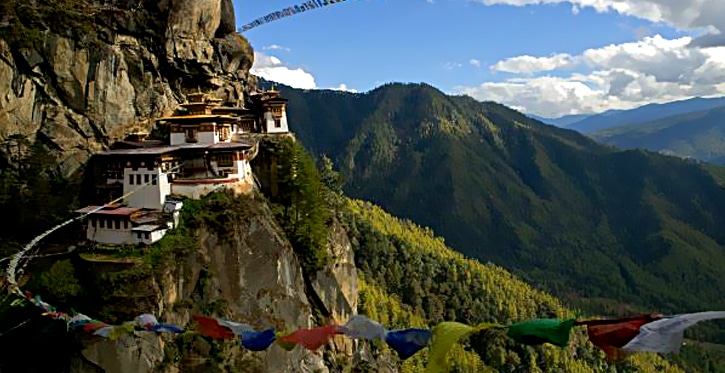Bhutan is a Buddhist kingdom in the eastern Himalayas. The country is known for its monasteries, fortresses, and dramatic landscapes. The country has a 70% forest coverage and agriculture is the backbone of Bhutan’s economy. Also, tourism and hydropower contribute to the national economy. But, the increasing dependence on hydropower for agriculture and the significance of agriculture to improve the national economy makes the nation prone to climate change ramifications. Hydropower in the country is also facing a crisis.
The holistic approach to measure the developmental aspect of Bhutan is Gross National Happiness (GNH). The measure tries to strike a balance between the happiness and material growth of the country. Bhutan gave a commitment to environmental protection, and it has remarkably maintained and fulfilled it. It has successfully been a carbon-negative country in the world. But, the changing dynamics of development globally have made it vulnerable to the effects of climate change.

Bhutan has been affected by the harmful impacts of climate change:-
Some of the many effects of climate change on Bhutan include a change in weather patterns, rainfall, droughts, flash floods, windstorms, forest fires, floods, landslides, dissemination of diseases, and change of animal habitats. Some time back, mosquitoes were spotted in Bhutan at 3,500 metres above sea level for the first time.
This negative impact of climate has serious implications on human life and the Livelihood of the citizens in Bhutan. This adds to the already existing problems of food security, biodiversity, energy, and water resources.
Reforestation began early in 1947 in Bhutan, in a contrast to the widely prevailing global deforestation tensions. Bhutan has always denied the priority of development at the cost of natural resources. Moreover, the constitution of Bhutan states that it would maintain 60% of the country’s land as forest. At present, the forest cover of Bhutan is 70%. The Parliament of Bhutan has the power to declare any part of Bhutan as a state reserved forest.
The nature preservation aspect:-
The challenge of decarbonization has a complex approach globally. It is impossible to stop it from the socio-economic development perspective. Despite it, Bhutan has managed to make commitments and stay firm on them to become a carbon-negative country. It has adopted a complete green economic development policy for decreasing carbon gas emissions.
Bhutan is increasing its susceptibility to climate change that is leading to the loss of lives. This is damaging the property and endangered cultural and heritage sites. Floods and landslides have increased in Bhutan during the last decade. The intensity of monsoons has improved in recent times that have affected the agriculture and infrastructure of Bhutan.

Bhutan has minor or no contribution to global warming. Despite this, it has been one of the most affected victims of global warming impacts. We can say that Bhutan is getting affected by the activities of others. The negative effects of climate change are disproportionate, and developing nations are the most affected ones.
It is important to strengthen and build the capacity of national, regional, global institutions to play a major role in dealing with climate change. The mere compilation and agreement on legislation by a country is not the only way to reduce the impact of climate change. The involvement of the world in consensus and including non-state aspects is important for reducing global warming.

Mention and appreciate Bhutan:-
The global discussions on climate change have agreed upon a commitment to decarbonize economies. The commitment for any vital decrease in global carbon emissions has not witnessed any significant outcomes. There is a need for more global coordination efforts in eliminating and adapting climate problems.
Bhutan has little and no contribution to climate change. It has not been rightly appreciated for its noble, and important sacrifice. At the same time, Bhutan does not have sufficient financial resources for reducing the impacts of climate change. Bhutan needs financial incentives to build capacity and implement pre-decided policies. Funds are also needed for accessing and developing scientific knowledge for averting climate change impacts.

The human community is using its resources and capabilities for development at the cost of natural resources. The wide forest cover with limited industrialization and clean energy makes Bhutan a carbon-negative country. We cannot deny that the stature of a carbon-negative country has compromised with the development and industrialization in Bhutan. This has left an impact on the economy of the country.
As a global community, it is important to recognize the contributions of the countries that are taking stern steps for preserving the natural environment. It does come at a compromise with industrialization, and ways should be developed for averting the compromise. Finally, countries should learn from the commitment of Bhutan in dealing with climate change.
Also Read: The United States has announced a diplomatic boycott of the Beijing Winter Olympics












